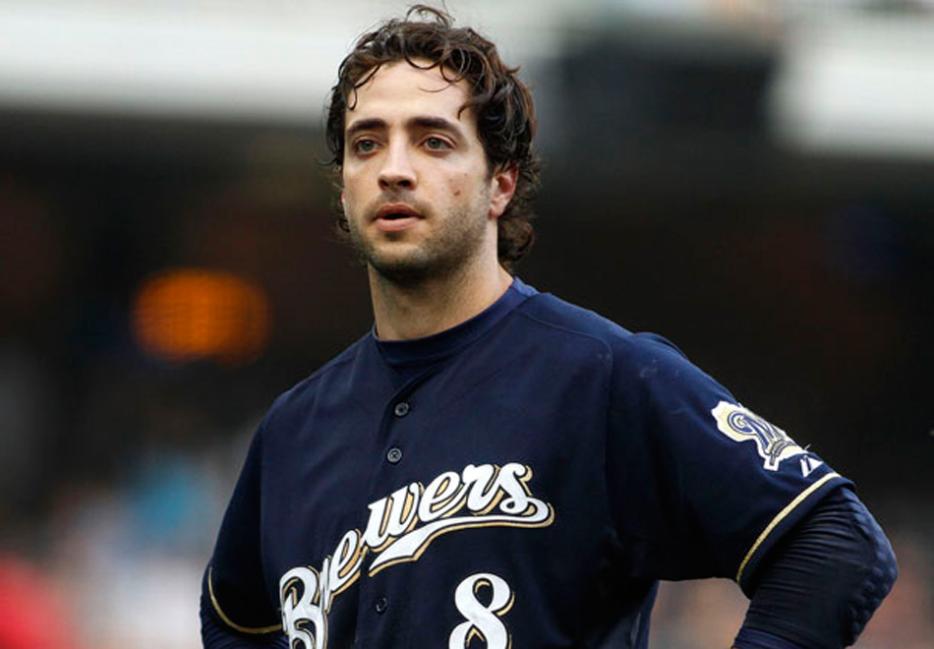The issues around the use of performance-enhancing drugs in sports can be hopelessly complex, so it’s best to start with basic facts we can agree on: Ryan Braun is an asshole.
That much should not be in dispute. This week the Milwaukee Brewer and former National League MVP was suspended for the remainder of the 2013 season, becoming the first casualty of a wide-ranging investigation into the Biogenesis clinic that will likely claim many more.
“As I have acknowledged in the past, I am not perfect,” Braun’s apology began—a sneering, provocatively half-hearted opening under any circumstances, but especially when your last words on the subject were brazen lies aimed at destroying the reputation of the employee in charge of testing you.
In 2012, when Braun was caught with elevated testosterone levels, he successfully appealed his suspension based on a technicality, then held a press conference to blame Dino Laurenzi Jr, the man who had collected his urine sample. “There were a lot of things that we learned about the collector, about the collection process, about the way that the entire thing worked that made us very concerned and very suspicious about what could have actually happened,” Braun said at the time, lying remorselessly.
As Josh Levin writes in Slate, “it’s hard to fathom a larger chasm in the world of sports than the one separating athletes from the people who collect and label their excreta.” The millionaire ballplayer blaming Laurenzi Jr is like you going to your place of work tomorrow and trying to pin your premeditated fraud on the cleaning woman. It makes you an asshole.
Braun’s suspension came in a bad week for PED news. Sprinters Asafa Powell and Tyson Gay, the second- and fourth-fastest 100 metre runners of all time, were both caught doping, as were a pair of NFL players. But perhaps most troubling, if for very different reasons, is the buzz of suspicion around Tour de France winner Chris Froome.
To be clear, the Kenyan-born British rider has never tested positive for an illegal substance in his life. No, the murmuring around Froome is entirely based on his performance itself. As reported in a fascinating New York Times piece, Froome and other cyclists are under scrutiny by “a small group of physiologists, sports doctors and cycling enthusiasts from around the globe who have formed a loose alliance on the Internet to weed out doping in cycling.”
The watchdogs attempt to use physics to measure how much power a cyclist is generating. Taking into account elements like length, gradient, time, weight, and wind resistance, they try to calculate in watts per kilogram the power produced by a given rider over any one segment of the race. Their rule of thumb is anything over 6 deserves a second look. More simply, they just look at the numbers. In one particular stage, Froome earned the third-fastest time ever, better than two chemically assisted Lance Armstrong times and in a top ten made up entirely of riders from cycling’s doping era. It’s a performance that “puts Froome well into the ‘miraculous’ level of human physiology,” writes Michael Puchowicz, a sports medicine physician in Arizona.
The work of a group of armchair sleuths, even armchair sleuths with distinguished scientific backgrounds, has been controversial. People have attacked their data, questioning their methodology. More fundamentally, their work marks a major shift in how we think about detecting cheating. Instead of urine tests and biological passports and increased surveillance, is it possible to pick out athletes for further investigation simply by looking at their performance itself?
It’s a fascinating, troubling question. It casts suspicion on people who could be entirely innocent. When asked about PEDs after winning a particularly impressive mountain stage, Froome sounded slightly hurt: “I think it’s sad that we’re sitting here on the day after the biggest win of my life talking about doping.”
In a puzzlingly over-the-top article, ESPN’s Jeff MacGregor warns that skepticism about otherworldly athletic performances threatens the “the entirety of Western civilization.”
“The seeds of the police state lie in the presumption of guilt,” he writes in that portentous, self-serious way of sportswriters who have mistaken their beat reporting from the adult playgrounds of America for a matter of grave national importance. “A free society rests on the principles of due process and the presumption of innocence,” MacGregor continues, seemingly forgetting that he is covering a game played by grown men in high socks.
No, admitting to niggling suspicions over an athlete’s sudden ability to hit home runs will not end in some hideous Orwellian dystopia. Democracy is not in danger.
What this kind of suspicion does threaten, however, is the fun of sports. Freakish performances, miraculous plays, impossible runs of luck—these are the reasons we watch sports. “That’s impossible,” is something we say in awe, not as an indictment of the athlete. When excellence itself becomes the grounds for suspicion and mistrust, you’ve gone a long way to ruining the thing that makes sports great.
So you can understand where MacGregor’s coming from. Who wants to cynically raise an eyebrow at every fantastic performance? But that, sadly, is the legacy of the PED era. After Lance Armstrong and Barry Bonds, Roger Clemens and Ben Johnson, it would be madness not to ask questions. Otherwise we just sit around, waiting for the next half-hearted apology from the next asshole.






